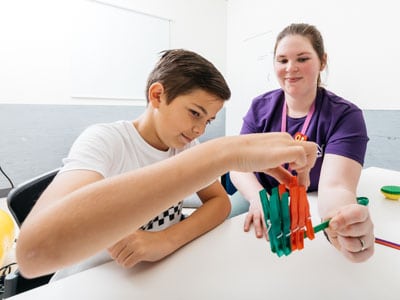Support professionals for autistic people
It takes a village to raise a child. It takes a child with autism to raise the consciousness of the village.
If you or your child is diagnosed as autistic, you will want the very best care and support. Autistic individuals can develop to live full, rewarding lives, particularly if they are provided with individualised therapies and supports.
Autism is not rare, and as a result there are a vast number of professionals with significant experience, who are highly qualified to support you or your child on your journey. Supports and services will vary depending on a range of factors including age, support needs, and location.
The disability system can be complex and anxiety provoking, so if you are entering into a world of new appointments and consultations it’s important to understand the various service providers and types of professionals who can make your journey a little easier.
General Practitioners (GPs)
GPs are usually the first step in the autism diagnosis journey. Your family doctor will listen to your concerns, explain what autism is and suggest several pathways towards diagnosis and support. In most cases your doctor will refer you to a specialist, who has undertaken extended education and training, and can provide you with detailed support.

Psychiatrists
As an autistic person, or the parent or carer of an autistic person, you may meet a psychiatrist – a professional specialising in human behaviour, mental health and development. Psychiatrists specialise in diagnosing and supporting people with mental health conditions and other conditions and will often work with other health professionals such as psychologists and speech therapists to develop an autism assessment and diagnosis.
Psychologists
Psychologists are health professionals who study the human mind – our mental health, emotions, intelligence, motivations and behaviours. Some may be involved in assessing for autism. They may work directly with people using psychotherapy (sometimes called cognitive therapy or ‘talk’ therapy) to help people find solutions to relationship, learning, performance and social challenges. Psychologists are not the same as psychiatrists who are medical doctors.
Occupational therapists
Occupational therapists (OTs) focus on promoting health, wellbeing and independence by enabling people to undertake everyday activities that they want or need to do, to have a meaningful life. These include, but are not limited to self-care, productive (school and work) and social activities. They work closely with autistic individuals, parents, teachers and other care-givers to implement strategies that will help people on the autism spectrum to develop skills in the early years, school and community environments.
Speech pathologists
Language problems and communication difficulties are two of the key diagnostic characteristics of people on the autism spectrum. Speech pathologists can assess, diagnose and support communication disorders. These may include difficulties with using voice (stuttering), speaking and listening, understanding language, reading and writing and social behaviours that flow from communication.
Dietitians
Children and adults on the autism spectrum can be fastidious eaters. Not only are they sensitive or resistant to some foods but certain challenges can make giving your child a nutritious diet tricky. Dietitians are health experts specialising in food, nutrition and diet. They provide guidance about diets and nutrition for people who have a range of health conditions, and certain disabilities or disorders.
Developmental educators
Developmental educators (or DEs) are allied health professionals who specialise in providing practical support to children and adults with a disability (such as autism) so they can achieve independence. Developmental educators work closely with families, service providers, and other allied health professionals to enhance the choice, social inclusion and quality of life for people on the autism spectrum.
Social workers
Social workers support families and individuals to achieve their full potential. A social worker may be employed to help and support parents of children on the autism spectrum as well as provide direct therapeutic support to autistic individuals. Social workers are trained in complex problem solving as well as counselling, monitoring child wellbeing and family support.
Behaviour Practitioners
Behaviour Practitioners include a range of professionals with a broad scope of qualifications and experience in relevant disciplines. They provide support to individuals and families on positive behaviour approaches and may develop, in partnership with the care team, a Behaviour Support Plan (BSP).
Disability Support Worker
A Disability Support Worker or mentor is a professional who supports an individual with a disability or a disorder and their family, to develop independence skills and to participate in the community. Disability Support Workers often support people who have various needs including people on the autism spectrum.



